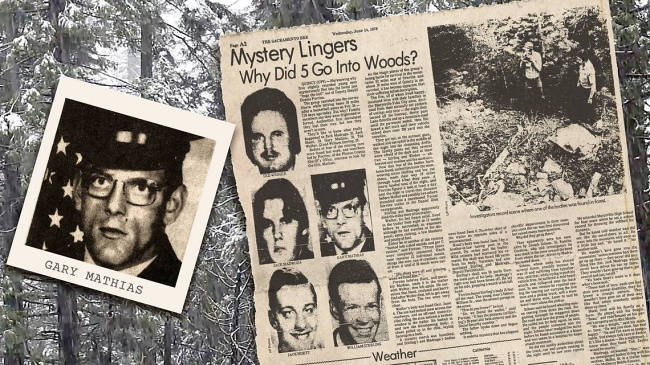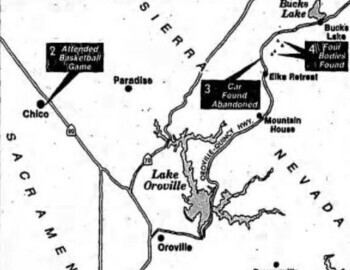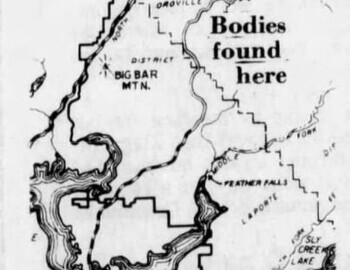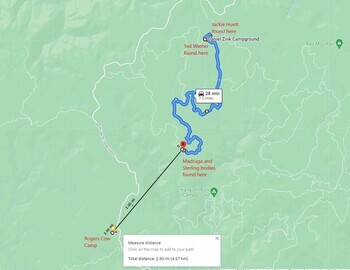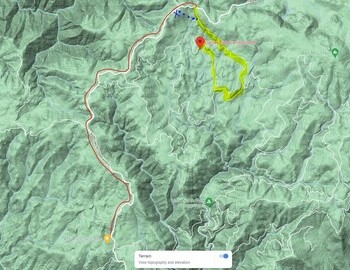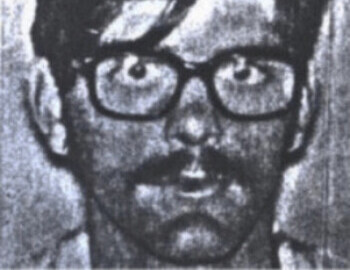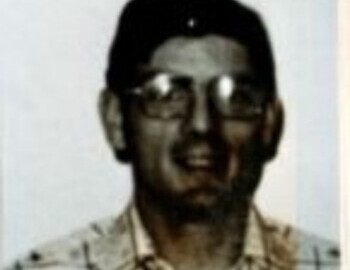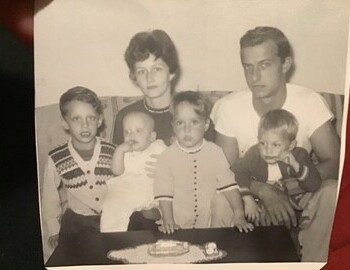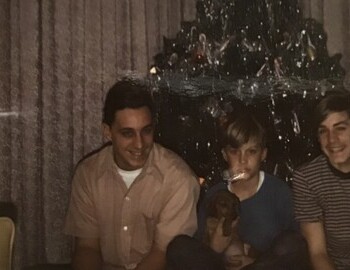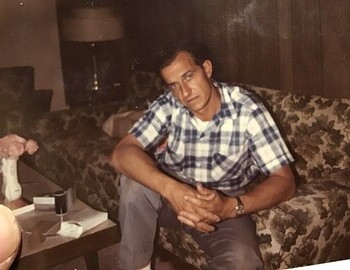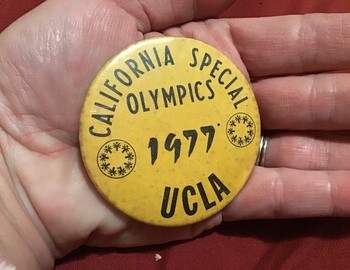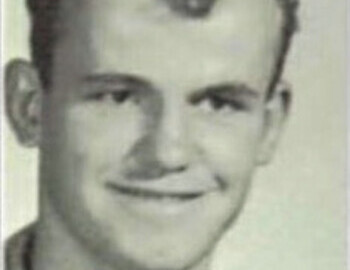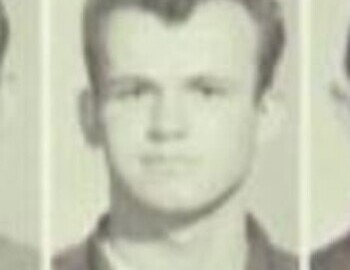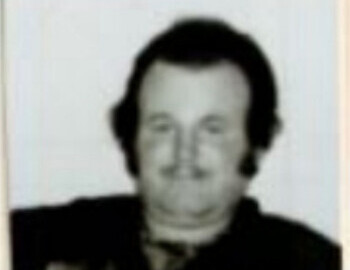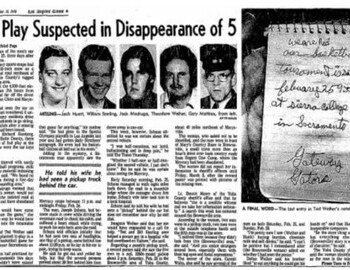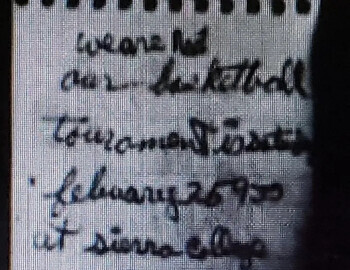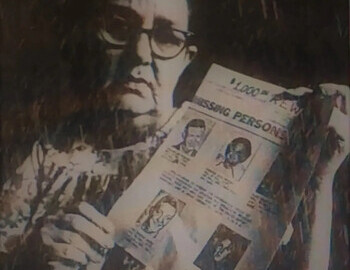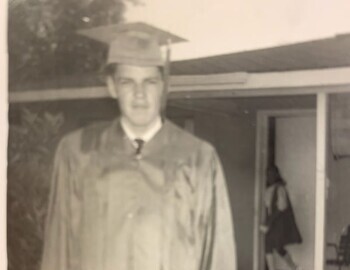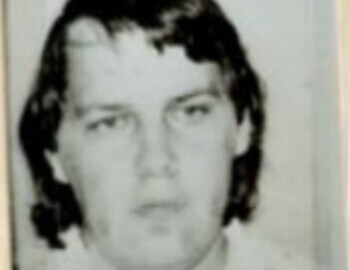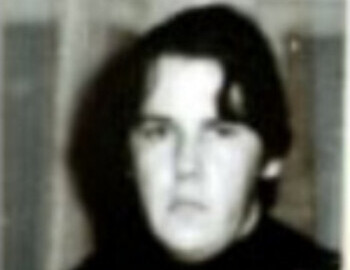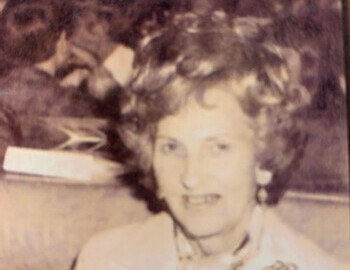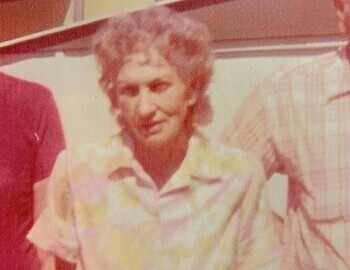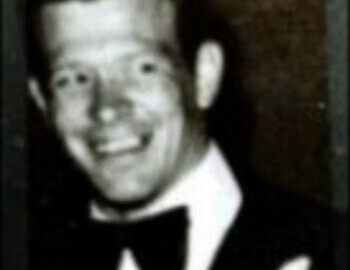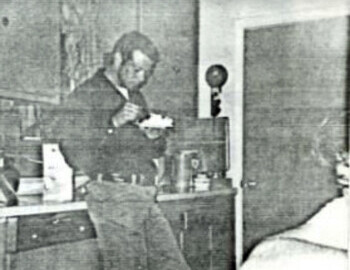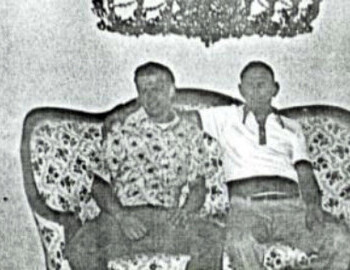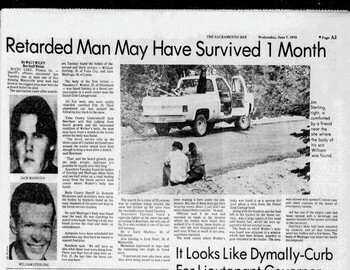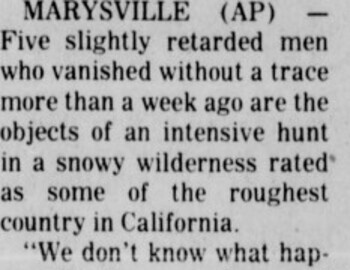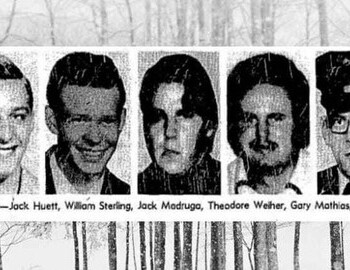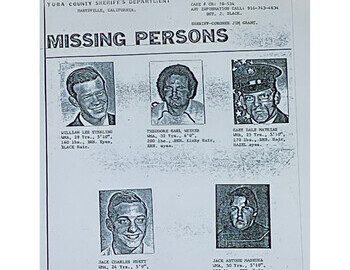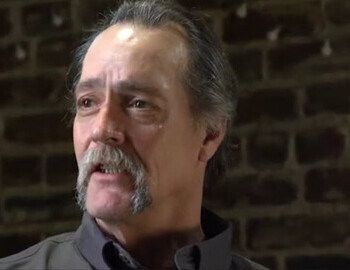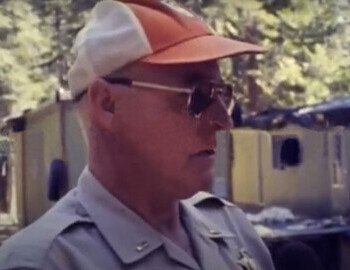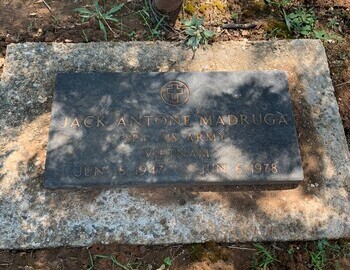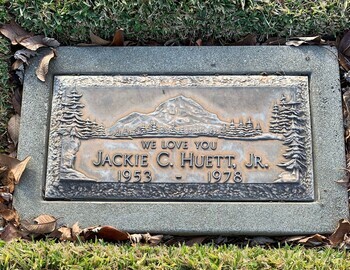
Out in the cold
Were four mentally disabled men set up to die in the woods?
February 27, 2019. Sacramento Bee By Benjy Egel
Following a 1978 interview with Mathias’ longtime acquaintance Janet Enzerra, Yuba County Sgt. James Black wrote that Mathias had repeatedly told Enzerra of a dream where he and several other people would disappear.
Four "studs" of the Yuba County special needs community – Jack Madruga, Ted Weiher, Jack Huett and Bill Sterling – met their premature end in freezing Plumas National Forest after a 1978 Chico State basketball game. What happened to the fifth member of their party, Gary Mathias, may never be known.
Slim with dark hair, a small birthmark on the right side of his chin and double vision when not wearing glasses, Mathias was an outlier among the Missing Five. The others’ intellectual disabilities became clear in their younger years; Sterling had spent most of his childhood in Napa State Hospital (then called Napa Insane Asylum), according to case files with the Yuba County Sheriff’s Office.
But Mathias was first placed in a psychiatric ward as a sophomore in high school following a bad hallucinogenic trip, his parents told investigators. He consistently used drugs throughout his service in the U.S. Army in the early 1970s, which included a sharpshooting medal, an AWOL arrest and a medical discharge for paranoid schizophrenia, according to the sheriff’s files.
While in sheriff’s custody after his AWOL arrest in February 1973, Mathias called two sergeants and a deputy to his cell, according to case files. When they opened his cell, he walked into the hallway stark naked and punched one of the sergeants in the face, sending blood spilling from his mouth and nose. He tried to hit the other sergeant as well but was subdued.
"I’ve been in the Army and I don’t like it, and I thought if I hit a cop, maybe they’d let me out," he told investigators at the time. He later received a medical discharge.
That same month, Mathias was watching TV at his cousin’s house around 8:30 am while the cousin’s 17-yearold wife slept, groggy from medication used to cope with an ongoing illness. The cousin went to check on Mathias after a bathroom break turned suspiciously long and allegedly found him straddling the woman, groping her breasts as she lay nearly motionless in her underwear, according to case files.
The cousin asked Mathias what he was doing, to which he allegedly replied that he wanted to kiss the woman. When the cousin said he was calling 911, Mathias allegedly responded, "Good, I want to go back to jail."
Mathias pleaded guilty to battery of a peace officer for the jail incident. A second charge of assault with intent to rape was dropped as a result of his plea deal, the Marysville Appeal-Democrat reported at the time.
Yuba County Superior Court employees are still unable to find details of Mathias’ sentence. Under current California law, he could have faced up to three years in prison if convicted of battery of a peace officer and nine years for assault with intent to rape.
But Mathias was out within eight months. In his next run-in with law enforcement that December, police had evidence he visited the home of a couple he knew after shooting methamphetamine and "dropping Bennies", or swallowing tablets of the amphetamine Benzedrine, according to case files.
- 2 -
Mathias was acting erratically, talking about how he wanted to stab a woman in the jaw, the couple told police. After he told their 3-year-old daughter "I thought I’d kill you once, I guess I’ll have to do it again," the man and woman reportedly kicked Mathias out of their house and watched as he pounded on locked doors until police arrived. Court records do not indicate he served any jail time in connection with the incident.
He had other run-ins with the law. An arrest on suspicion of grand theft auto. A citation for disturbing the peace and driving without a license where he allegedly told the arresting officer "F--- you cops, you all are motherf---ers." A slew of bar fights. Complaints he was prowling at a local cemetery.
Mathias was "known to this department", as an investigator with the Yuba County Sheriff’s Office put it at the time of his disappearance.
Daring escapes
Drugs had warped Mathias’ brain, said Gary Whitely, who started dating Mathias’ sister Sharon in 1967, later married her and was going through divorce proceedings when the boys went missing. Whitely and Mathias spent summer afternoons near the end of high school drinking beer and swimming with their friends, he said. But when the two reconnected after their military service – Vietnam for Whitely, a base in Germany for Mathias – Mathias was largely in-and-out of his family’s home and not mentally stable, Whitely said.
After being picked up by Stockton police in 1974, Mathias was admitted to a nearby state mental hospital. He spent two days there before crawling out through a drainpipe and walking and hitchhiking back to Marysville still wearing his hospital pajamas, according to case files. It was a daring but familiar escape: Mathias had previously sneaked out of Letterman Army Hospital’s psychiatric ward in San Francisco and later walked away from another mental health facility in 1975, investigators’ notes said.
In 1975, with a short stint at Yuba College proving unsuccessful, Mathias abruptly left school and moved to Oregon to stay with his grandmother. His mother and stepfather, Ida and Robert Klopf, finally reached him on the phone weeks later and pleaded with him to come back to Yuba County. He hung up on them, they told sheriff’s investigators. The Klopfs didn’t hear from Mathias until he showed up on their doorstep five weeks later, ragged and filthy. He had walked from Portland to Marysville, he told them, stealing milk off porches and eating dog food to stay alive on the 540-mile trek.
Later that year, a Yuba County couple awoke to find Mathias standing in their bedroom, according to case files. He had punched through the window and unlocked their front door, and was now looking for a ring to return to Satan, the couple told police. When the couple asked why he was there, he said they were in his house and he was there to collect rent.
Mathias’ path straightened out after that. He started to consistently take his schizophrenia medication and was able to hold down a job with his stepfather’s gardening business, Robert Klopf told the Washington Post in 1978. He had no notable contact with police during the two years leading up to his disappearance, and Klopf said he had not "gone haywire" in private during that time.
He joined Gateway Projects and started hanging out with Sterling, Weiher, Madruga and Huett a few months before the boys went missing, according to case files. But even under the mellowing haze of antipsychotic drugs such as Cogentin, Stelazine and Prolixin, Gateway Gators basketball coach Robert Pennock told investigators he still felt like Mathias "could possibly flip out at any time". Gateway has been closed for decades and its leaders from the time are dead, leaving the question of how Mathias got involved in the first place unanswered. Jack Beecham, the former Yuba County sheriff, said he doesn’t know how Mathias got into the program.
Following a 1978 interview with Mathias’ longtime acquaintance Janet Enzerra, Yuba County Sgt. James Black wrote that Mathias had repeatedly told Enzerra of a dream where he and several other people would disappear. Enzerra called Mathias "a very violent person, hurting several men seriously, and (said) that he also hates women", according to Black’s interview notes.
- 3 -
Still alive today?
The other boys’ parents weren’t comfortable with Mathias either, even though they didn’t seem to know about his criminal record, Jack Beecham said. He was a stronger personality, the only one among them who would fight back if threatened, according to investigators. Of the five missing boys, the case file said, he would be the most likely to "lead and suggest places to go or things to do".
"I know parents at the time told us – they told me personally – that they had deep concerns about Gary being involved in this. They were unabashed in their opinion in telling me that", Beecham said. "The other four were always together. They walked a lot of places together, always together, and he just was a different personality type. He didn’t meld with the other four, according to (the parents)."
Ida Klopf had taken her children and fled her husband, Garland Mathias, when Gary was just 3 years old, making it from Yuba County to Bakersfield before calling Garland and asking him to pick them up, according to sheriff’s files. Klopf filed a restraining order against Garland when the two split for good some years later, Whitely said.
Garland rarely came up in Whitely’s conversations with Sharon, his ex-wife and Gary’s sister. One day in 1987, though, Sharon’s father showed up at her home out of the blue, Whitely said. He ate dinner with Sharon and her two children, then about 10 and 11 years old, and left the house without incident.
A few days later, Garland Mathias committed suicide, Whitely said. Sharon Maxwell Mathias would die of a gunshot wound to the head in 2002, according to the Placer County Sheriff’s Office, a shot Whitely said was self-inflicted. Yuba County Superior Court and Sheriff’s Office officials could not find evidence of the restraining order or Garland Mathias’ cause of death.
"I do believe that the mental illness that (Gary) and my ex-wife had, they inherited from their dad", Whitely said. "As long as (Gary) was on medication, he wasn’t too bad. But when he thought he was okay and not doing his medication – same (thing) with my ex-wife, Sharon. As long as she was on medication, she was doing OK."
Maybe Gary Mathias was a victim of inexplicable circumstances deep in the woods, just like the four other boys. Maybe he chose not to take medication that carried side effects of drowsiness, lethargy and dizziness in light of his Special Olympics basketball game the next day, and inadvertently brought his friends out to their deaths on a schizophrenia-induced adventure.
Maybe he’s alive today.
He was a fighter, that much is clear, who was willing to do whatever it took to survive. Walking dozens of miles out of the snow in lightweight clothing would have been excruciating, but so likely was walking from Portland to Marysville and shimmying his way out of mental health institutions.
About three weeks after the boys went missing, a Yuba City woman named Debbie Lynn Reese picked up the telephone, investigators said. "Hello?" she said. "I know where the missing five men are", a man on the other end of the line said before hanging up.
The man called back the next day, Reese told authorities, and said, "I need help ‘cause I really hurt those guys bad." When she asked "who did you hurt?" he replied, "don’t play dumb with me" and hung up.
There was one more call the next day, on March 17. "Those five guys are all dead", the man said. "They’re all dead?" Reese asked. "They’re all dead", he repeated. Then he hung up, and Reese never heard from him again.
Beecham doesn’t think that was Mathias, though. Mathias couldn’t get his medication if he went off the grid, and he couldn’t stay out of trouble without his medication. Then there were the family ties: Even on his long walkabouts, he always came back to his mother and stepfather’s house.
"My thinking is, as tough as he was, he just went down in those conditions out there", Beecham said. "That manzanita is bad stuff. I mean, it was so thick, like eight to 10 feet high. I just think he went down and disappeared."
No one pulled a trigger on the boys, but something – or someone – killed them. Asked if he thought Mathias set his brother and the others up to die, Dallas Weiher replied "that’s the only thing that makes sense."
Weiher recalled that the hit ’90s television series "Unsolved Mysteries" sought the involved families’ permission to do an episode on the Missing Five some time after their disappearance. Every family agreed except Mathias’, despite him still being missing, Weiher said. Mathias’ surviving siblings declined to comment or could not be reached by The Bee.
"That’s just suspicious. I’m not saying they knew, but, well, you can probably guess what I think", Weiher said.
Many questions still remain in Beecham’s mind about what happened the night of Feb 24, 1978, and the weeks that followed. But he’s convinced that whatever took the boys up into the woods, it wasn’t their own doing.
"They were either forced or manipulated", Beecham said. "And where does Mathias come into that? Maybe he had nothing to do with it – we’ll never know. But I think he did.
You can discuss this topic on Dyatlov Pass Forum.
Yuba Podcats
"This case is bizarre as hell."
— Jack Beecham, Yuba County Undersheriff (1977-1979)
On February 24, 1978, five men from the Yuba County, California-area vanished in the wilderness of Northern California. They had set out on what should’ve been a quick road trip to watch their favorite basketball team in a neighboring town. But all five friends wound up missing or dead.
The finer points of this story are more complicated, though. Three of the men - Ted Weiher, Jackie Huett, and Bill Sterling—would likely fall on the autism spectrum today. One of the men - Gary Mathias - was a person living with schizophrenia. And the last man - Jack Madruga, the person driving - was never diagnosed at all.
Days after their disappearance, Madruga’s 1969 Mercury Montego was discovered abandoned 60 miles east of Chico, on an isolated, snow-packed mountain road deep in the Plumas National Forest.
Months later, a group of motorcyclists happened upon the emaciated, decomposing body of Ted Weiher, tucked neatly under eight sheets, inside an empty off-season forestry trailer 12 miles north of where the car was deserted. Based on beard growth, experts estimated Weiher had survived at least two months.
In the days following, searchers found the skeletal remains of Sterling, Madruga, and Huett nearby. None of the men, officials claimed, died of foul play. The body of Gary Mathias has never been recovered.
Timeline of events
| 05-26-1946 | Theodore Earl Weiher born |
| 06-18-1947 | Jack Antone "Doc" Madruga born |
| 04-05-1949 | William Lee Sterling born |
| 10-15-1952 | Gary Dale Mathias born |
| 03-29-1953 | Jackie Charles Huett Jr. born |
| Mid-1970s | Ted Weiher, Jackie Huett, Bill Sterling, and Jack Madruga began working at Gateway Projects. |
| 1977 | Gary Mathias began playing on the Gateway Gators with Weiher, Huett, Madruga, and Sterling. |
| 02-23-1978 | A forest service snow cat ran up the road to the trailer, leaving a packed path in the snow that the men might have followed. |
| 02-24-1978 | 6 PM Joseph Schons’ VW Beetle bottomed out at the snowline on a recreational road near Rogers Cow Camp and he suffered a heart attack trying to push it free. |
| 6:30 PM The men departed for the basketball game at Chico State University. | |
| 10 PM The men drove to Behr’s Market, three blocks away from the Stadium, bought snacks for the drive home, and then left the store. | |
| 12 AM Schons claimed he saw a car matching the Mercury Montego on the road near Rogers Cow Camp. | |
| 02-25-1978 | 8 AM Melba Madruga reports her son as missing to the Yuba County Sheriff’s Department but is told to wait 24 hours and call back. |
| 8 PM Melba Madruga filed an official missing persons report. The search began between Marysville and Chico. | |
| 02-28-1978 | A forest service ranger discovered the abandoned Mercury Montego on a recreational road near Rogers Cow Camp. The search for the men shifted to the Plumas National Forest. |
| 03-30-1978 | Official search efforts were called off until new leads developed. |
| 06-04-1978 | Sixteen-year-old Roger Koch discovered the badly decomposed body of Ted Weiher, tucked neatly beneath eight sheets, in a forestry trailer near the Daniel Zink Campground. |
| 06-05-1978 | Yuba County officially identified Ted Weiher as the man whose body was found in the forestry trailer. There were no signs of foul play. Officials note that Weiher’s shoes were missing, but Mathias’ were left behind, which led investigators to believe the two men were at the trailer together. |
| 06-06-1978 | The remains of Jack Madruga and Bill Sterling were found on opposite sides of a canyon road roughly three miles north, as the crow flies, from the abandoned Montego and seven south of the service trailer. |
| 06-07-1978 | Jackie Huett’s body is discovered by his father, Jack Huett Sr., less than a mile away from the trailer. The search for Gary continued. |
| 06-09-1978 | Two Forest Service workers claimed they told Butte County about the trailers at the Daniel Zink Campground. |
| 06-20-1978 | Plumas, Yuba, and Butte Counties called off their search for Gary Mathias. |
Maps and photos

